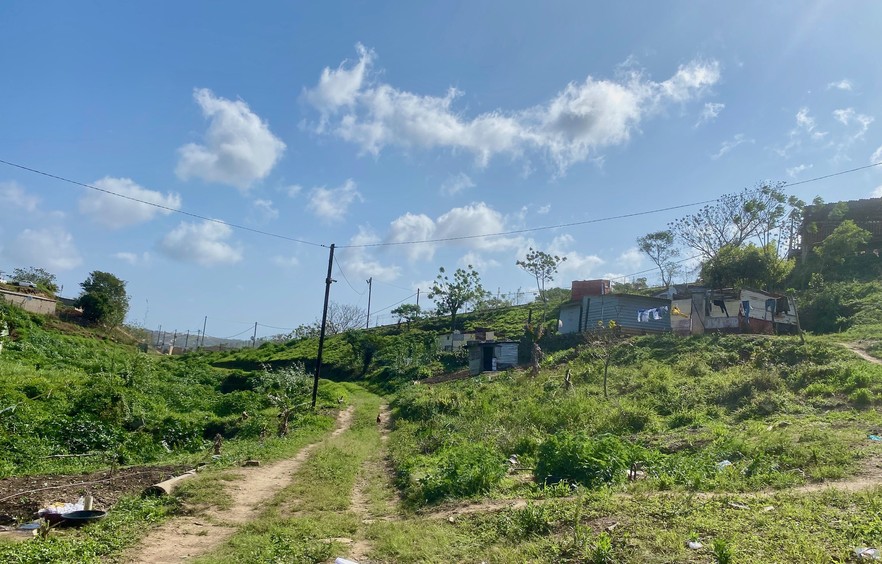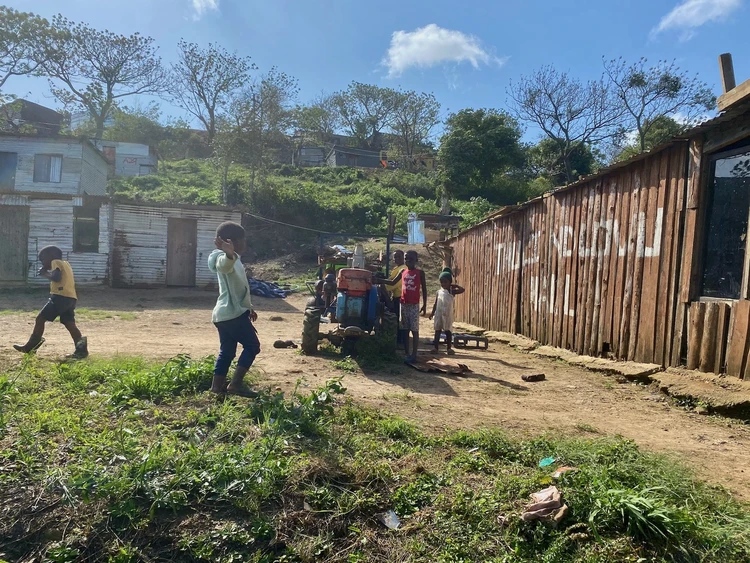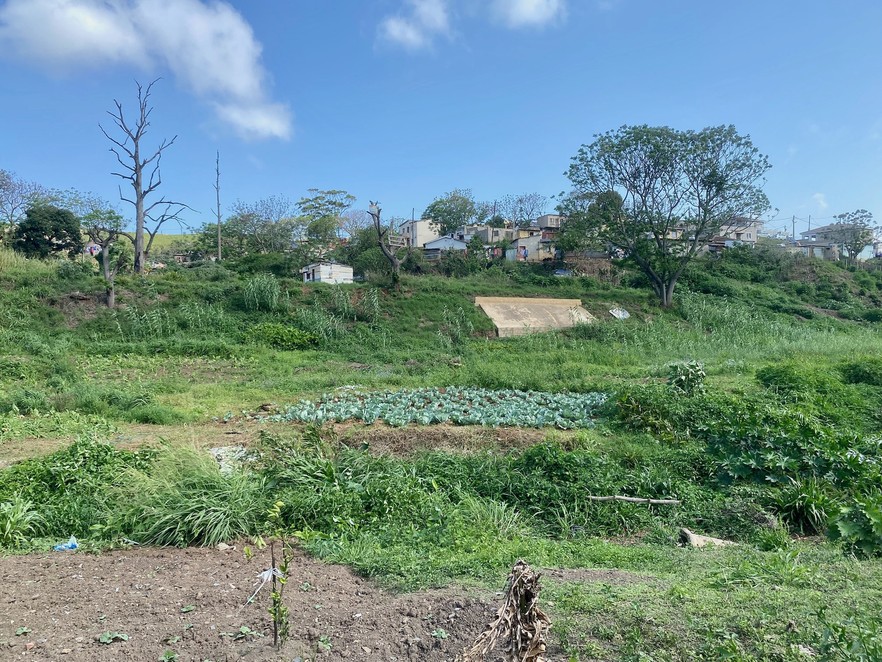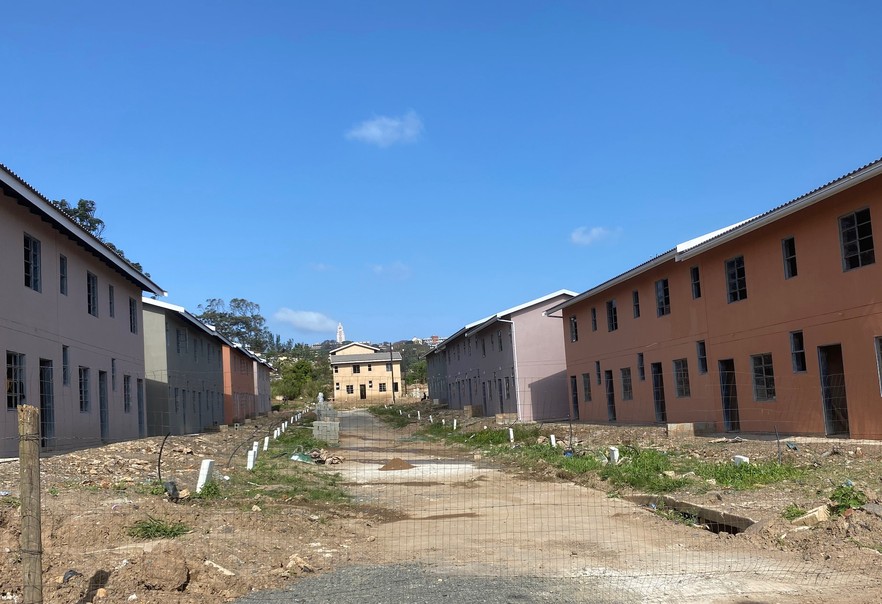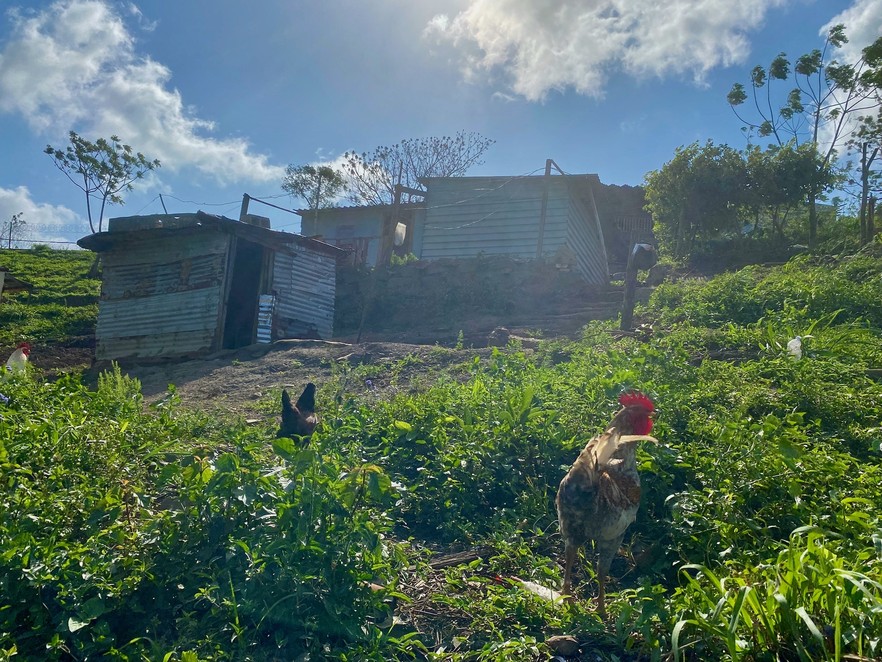Promised land is a battleground: inside a Cato Manor informal settlement
Murder and fear stalk eKhenana shack dwellers
The road in and out of eKhenana (promised land of Canaan) in Durban near the University of KwaZulu-Natal main campus. Photos: Greg Arde
Land occupiers at eKhenana in Cato Manor, Durban, say they live in fear since newcomers have arrived. The conflict between residents and “outsiders” involves allegations of criminal and politically aligned heavies and the internal struggles of organisations fighting for the rights of poor shack dwellers. The conflicts occur against the backdrop of the state’s failure to provide sufficient housing.
The current councillor in Cato Manor is ANC. His predecessor, former ANC councillor Mzi Ngiba, is in prison awaiting trial for murder. Ngiba and four others are accused of murdering ANC ward candidate Siyabonga Mkhize and ANC activist Mzukisi Nyanga in November 2021. The case is due to resume in February.
Though they have no proof of it, some eKhenana residents believe the people who are “invading their land” are connected to the ANC.
They say they have been forsaken by both the eThekwini municipality and the shack dwellers’ movement Abahlali baseMjondolo (ABM), which has made historic strides in representing landless people.
Children playing outside the eKhenana community hall.
Promised land
eKhenana is a shack settlement in a little valley not far from the main campus of the University of KwaZulu-Natal.
When the wind whips through the valley, the corrugated iron of the shacks rattles, creating an eerie atmosphere at night.
During the day, residents gather around a solar-powered office in a repurposed shipping container sourced by ABM.
Beside the office is a community hall dedicated to political philosopher Frantz Fanon and black consciousness leader Steve Biko.
eKhenana has vegetable gardens and a crèche, established by Lindokuhle Mnguni, a charismatic youth leader from ABM, who was assassinated in 2022. Mnguni, who was chairperson of the eKhenana commune, and one of at least four people murdered here in recent years.
Since then, a donor has installed CCTV cameras for better protection.
The valley is fenced with barbed wire and has a padlocked gate, but that hasn’t stopped newcomers from setting up at least eight shacks without the community approving them.
eKhenana is a Zulu approximation of the biblical word Canaan, and Mnguni’s followers say he led them in 2018 to the “promised land” – vacant state-owned land they laid claim to and where they built over 100 dwellings.
When the City tried to move the shack dwellers, the Socio-Economic Rights Institute of South Africa (SERI), a public interest law firm, stepped in to represent the community. SERI secured an interdict against the municipality in February 2019, preventing it from demolishing 110 dwellings until it provided alternative accommodation.
Deborah Raduba, an attorney with SERI, said the municipality then instituted eviction proceedings, which are currently pending in court.
Raduba said SERI works with ABM, and they are trying to get security of tenure for the 110 families.
“Our clients moved to the property, and the anti-invasion unit was demolishing their shacks. We got an order that stopped the demolition pending the City providing alternative accommodation.
“The City offered to do this but never made good on the offer to date. Until they do, the dwellings can’t be demolished.”
“The City regards these demolitions as ‘clean ups’, but you can’t clean up human beings. There is a housing crisis in South Africa and the current social housing plans and their implementation are not sufficiently addressing it.
“People have been waiting since 1990 for housing, so they stay in shacks as a desperate measure, and yet their homes are unlawfully demolished. They are penalised for being poor.”
Vegetable gardens planted by eKhenana residents.
Fear in eKhenana
Since the court case, the City has not attempted to demolish the eKhenana shacks. Instead, sites in eKhenana are being sold, and this is being resisted by estranged Abahlali members who say there isn’t enough land to accommodate new people. They maintain that only the 110 households cited in the court action can legitimately claim the land.
The estranged Abahlali supporters spoke to GroundUp on condition of anonymity. They say they are scared because of the murders.
They said when the newcomers arrived they tried to dissuade them from putting up shacks.
In June, three Abahlali supporters were arrested amid allegations that they tried to assault the newcomers and drew a gun on them.
They say that when the newcomers arrived and they called on Abahlali for help, they were told to call the same land invasion unit that had tried to remove them years earlier.
GroundUp was told by the estranged Abahlali members that “someone”, they suspect in the ANC with links to a strong ANC-aligned family in Cato Manor, is selling plots for R6,000.
The Abahlali members at Khenana say people have circulated in and out of the original 110 dwellings protected by the interdict from demolition. Also, after Mnguni’s murder, some of the occupants fled and never returned. Currently, there are about 66 people, including 22 children. Many sleep together in the hall for safety.
The Abahlali members accuse the movement of appropriating Mnguni’s legacy for gain. They say they have to face “taxi owners linked to the ANC” who have tried to burn down their houses.
“We fought the land invasion unit. Look, I have the scars on my arms from their rubber bullets. I nearly died fighting for this land. This is our land,” said one.
Another said, “It makes me angry that Abahlali is using us for their benefit. They discuss our struggle at international conferences.”
The Abahlali members said after Mnguni’s murder, some local leaders were moved to a safe house in the city. In that process, their were claims for subsistence costs submitted to Abahlali. They claim they were asked to falsify these by some Abahlali leaders, which they refused to do.
ABM president S’bu Zikode said the organisation did not forsake eKhanana over money or individual issues, but because the settlement did not hold elections or renew its branch affiliation or seek assistance to resolve any issues that prevented this from proceeding. ABM says it cannot legitimately claim to represent people in a community without a democratic mandate premised on branch elections, and there had been no ABM elections in eKhenana, the organisation said.
Zikode said ABM was “absolutely scrupulous with money” and was not capitalising on the struggle at eKhenana because it had not made any statements about the community since the Abahalali branch lapsed last year.
Read Zikode’s full response here.
A new housing development down the road from the eKhenana commune with the Howard College tower of the University of KwaZulu-Natal in the background.
eThekwini’s slow housing delivery
The plight of the eKhenana community mirrors the struggles of many people in Cato Manor trying to secure housing in an area with a troubled history.
Near eKhenana is a new low-cost housing development yet to be occupied. When asked for details on this development and its beneficiaries, the City did not say.
But, in response to a list of questions, municipal spokesperson Gugu Sisilana said the City estimated that eThekwini had 316,000 informal structures in 304 informal settlements.
Some of these settlements benefit from in-situ upgrading, which takes different forms. Some are full housing projects with individual service connections and standard 40-50m2 houses with title deeds. Others are upgrades through providing services, including toilets, taps, showers, roads, pathways, stormwater controls, electrification and improvement of waste management and disaster readiness.
This is funded almost exclusively by national government grants.
Housing delivery has declined considerably, the City conceded.
“Housing delivery peaked just before 2010 when 16,000 units were built per year. Not all these units were grant funded and the high rate of delivery greatly affected City coffers, hence a decision was taken to align construction of new houses with the availability of dedicated housing grants. Current levels of grant funding for new houses allows for the annual delivery of 1,300 – 2,500 new fully subsidised homes per year.”
In 2020/21, the City spent R744-million on housing. It is projected to spend R355-million in 2024/25.
The state pays just over R255,000 to build a house of between 40–50m2 with services.
Sisilana says additional funding is required because of the challenging topography and many steep slopes in Durban.
She said the City takes aerial photographs annually to estimate the growth of the settlements.
“The City is conducting a ward-by-ward audit of vacant land, focusing on state-owned portions. Well-located land is extremely scarce, but the City is actively acquiring land for housing. More than 250 hectares have been acquired over the last three years.”
Chickens roam among eKhenana houses.
Support independent journalism
Donate using Payfast

Don't miss out on the latest news
We respect your privacy, and promise we won't spam you.
Next: Families evacuated from their flooded homes in Nelson Mandela Bay
Previous: Eastern Cape village still without water 30 years since democracy
© 2024 GroundUp. This article is licensed under a Creative Commons Attribution-NoDerivatives 4.0 International License.
You may republish this article, so long as you credit the authors and GroundUp, and do not change the text. Please include a link back to the original article.
We put an invisible pixel in the article so that we can count traffic to republishers. All analytics tools are solely on our servers. We do not give our logs to any third party. Logs are deleted after two weeks. We do not use any IP address identifying information except to count regional traffic. We are solely interested in counting hits, not tracking users. If you republish, please do not delete the invisible pixel.

